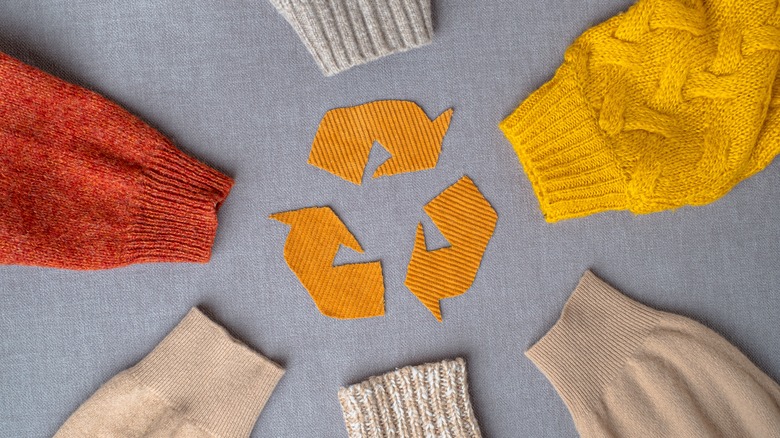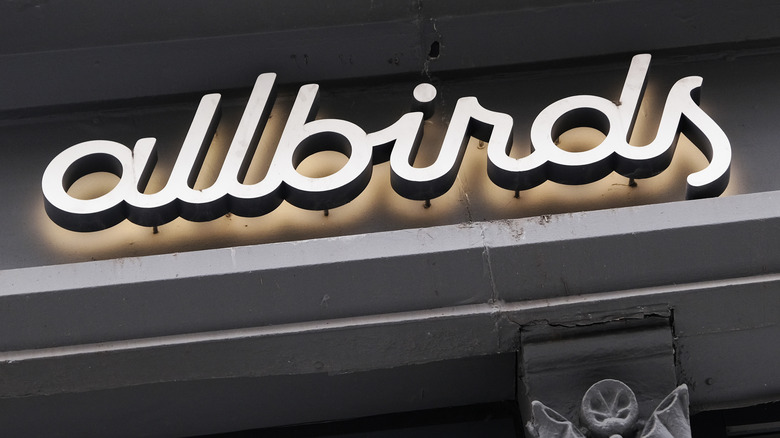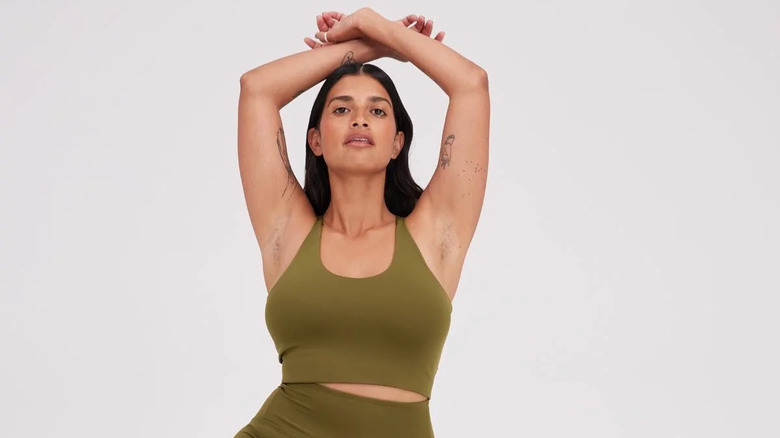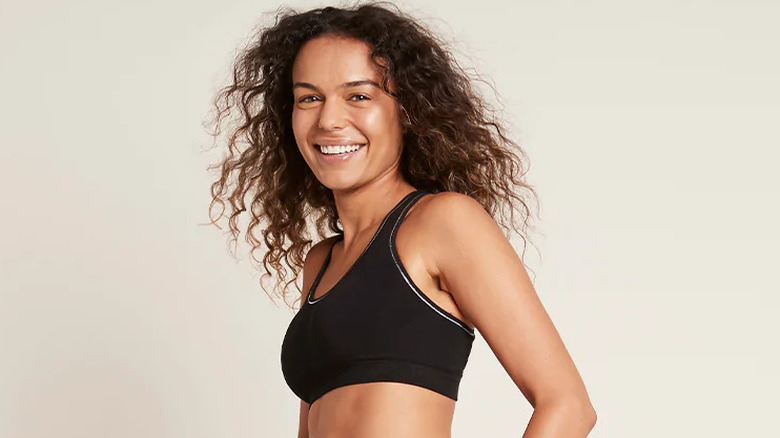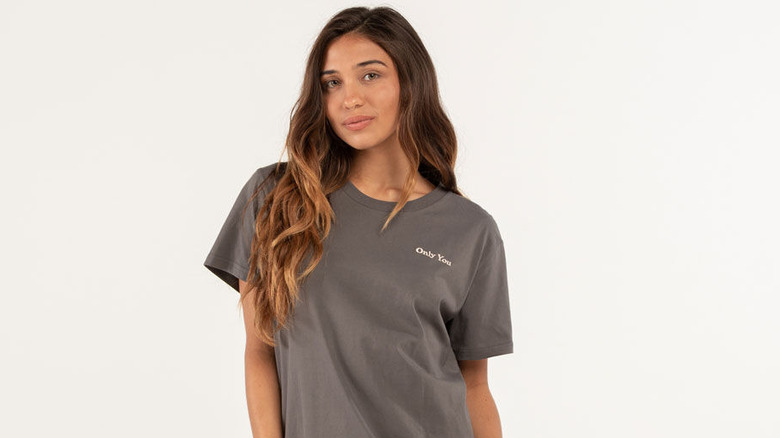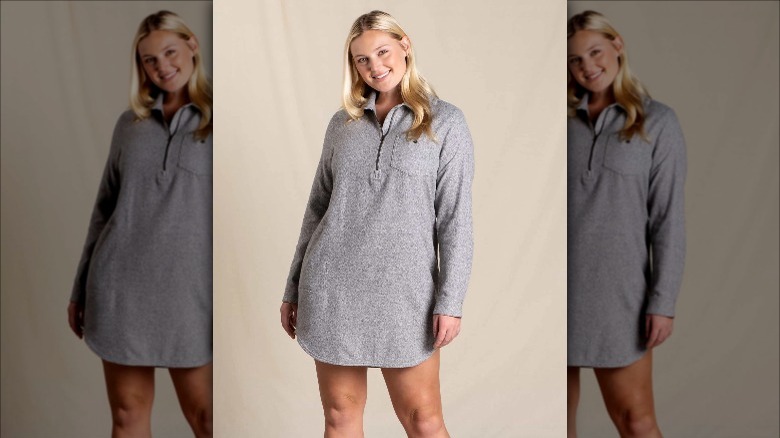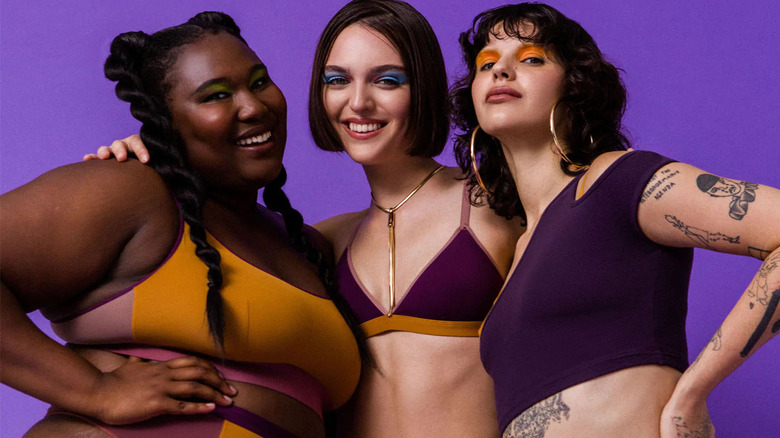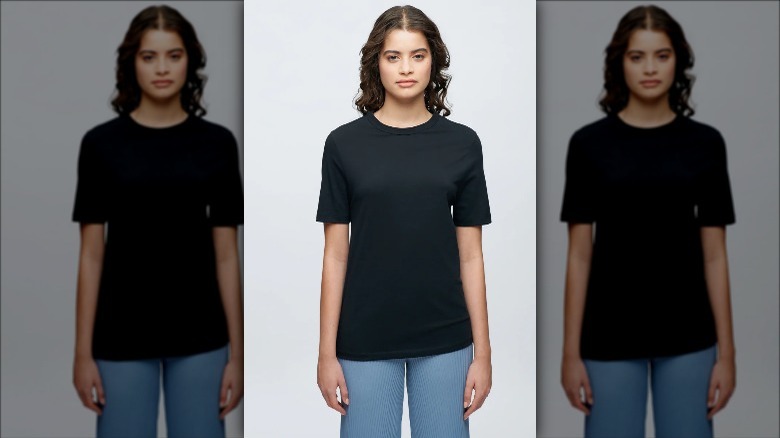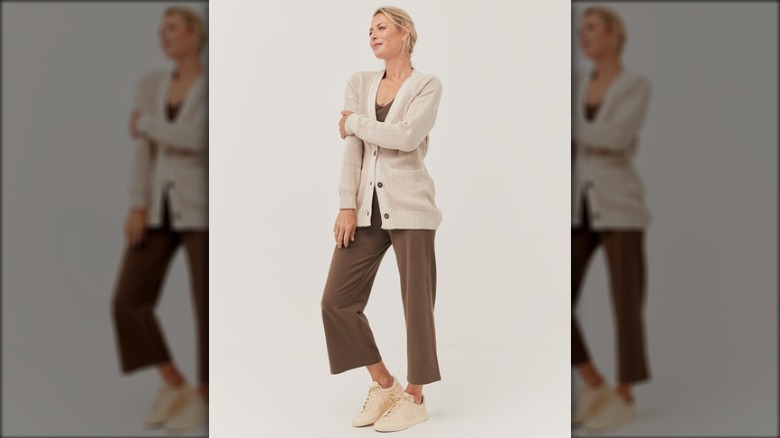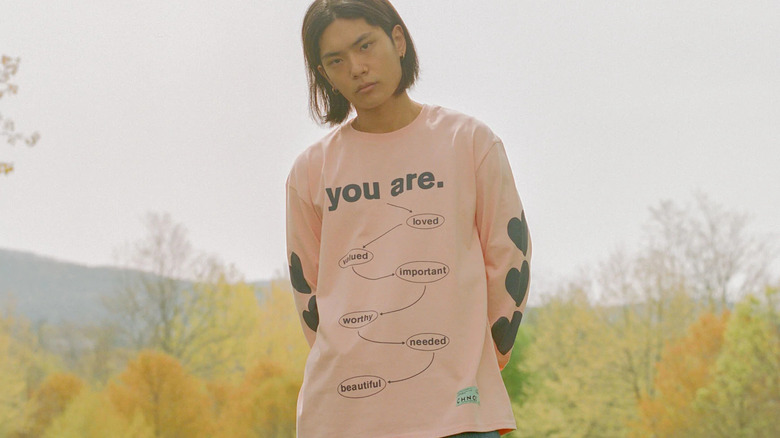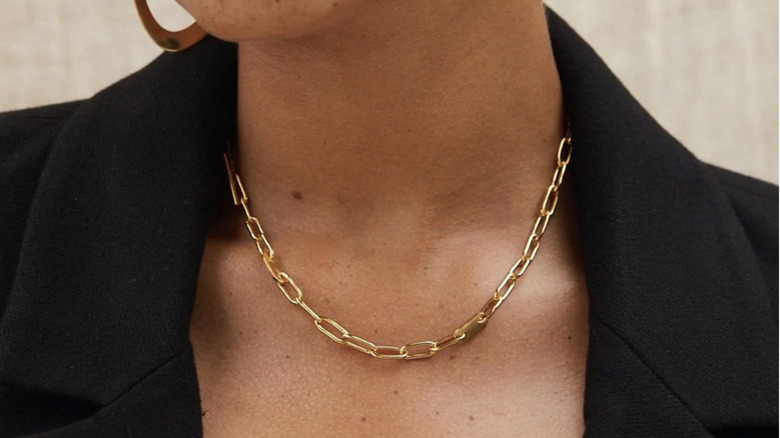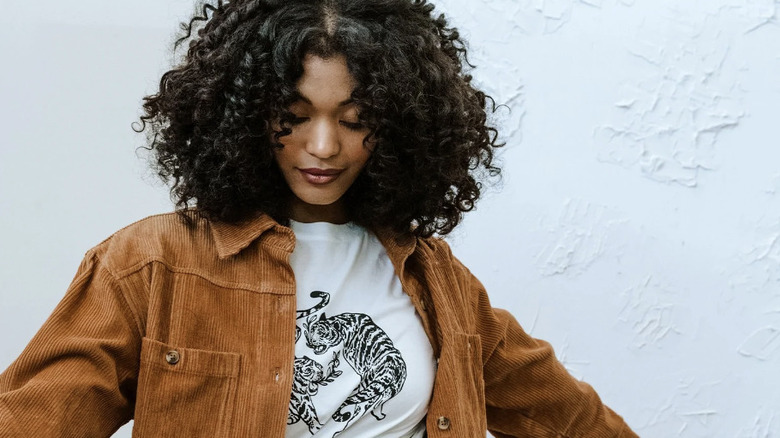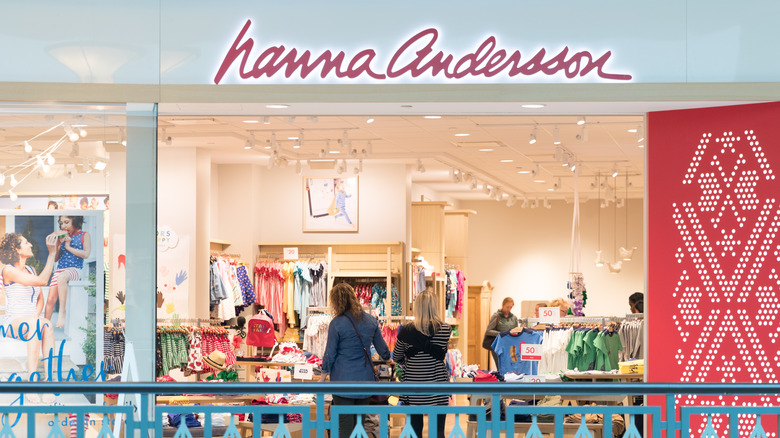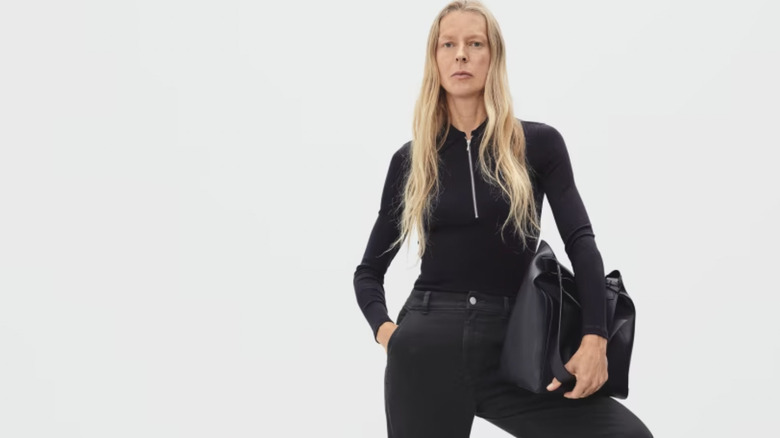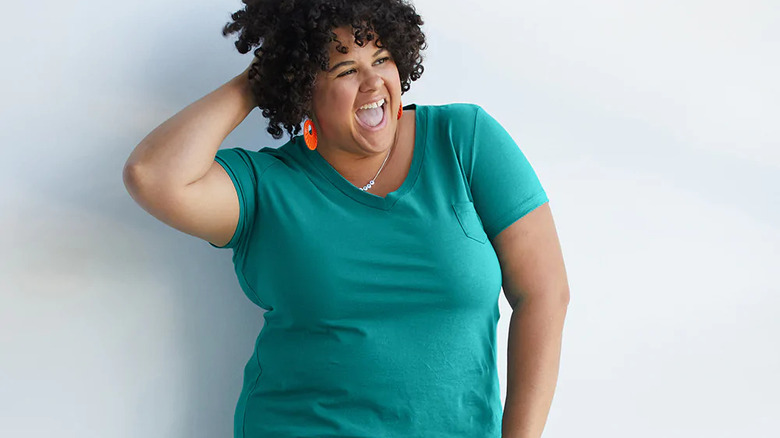14 Sustainable Fashion Brands That Are Actually Affordable
Fashion is a lot of things to a lot of people, but many have become concerned with the detrimental effects of the fast fashion industry. Fast fashion is the result of consumer demand driving the catwalk trends of the season into production. It is often cheap, inefficient, and, most importantly to businesses, profitable.
It would seem that the trade-off for trendy comes at the price of sustainability. The fast fashion industry makes up around 10% of global CO2 output, relying heavily on fossil fuel chemicals in the production of textiles — the same fossil fuels that are spiking greenhouse gas emissions contributing to global warming, according to Bloomberg News. Fast fashion is costing us our beautiful planet — but fear not! Some brands are changing the game.
It's true that more sustainable clothing production has often been linked to an uptick in pricing; however, Ayesha Barenblat, founder of the fashion nonprofit Remake, explained to Vogue India that sustainable fashion pricing should not be compared against its fast fashion counterpart because there's so much more going into it. "A sustainably made and priced garment reflects a brand's dedication to reducing their impact on the environment and the makers as well," she said. While sustainable fashion is naturally going to cost more than fast fashion, affordable and sustainable can still go hand in hand. Some brands are making the basics work for all demographics and negotiate the price of being trendy and doing better for our planet.
Allbirds sneakers offer footwear without the carbon footprint
Allbirds, a footwear and apparel company that specializes in wool fabric, came onto the sustainability scene in 2014. With the tagline "Mother nature made us do it," co-founders Tim Brown and Joey Zwillinger combined their love of the planet with their expertise in merino wool, engineering, and renewables — creating their unique wool fabric out of only natural materials. In 2021, Allbirds released The Flight Plan, which outlines the company's commitment to reducing its carbon footprint by half by 2025, and as close to zero as possible by the end of 2030.
Allbirds footwear ranges from around $90 to $165. Allbirds offers an array of sneakers, sandals, slippers, flats, and even hiking shoes for men and women. Apparel and accessories start at around $12 and cap out at around $120 for pullovers.
In an interview with Business of Fashion, Ashley Comeaux, vice president of Allbirds product design, discussed the significance of integrating sustainability into their production model, saying, "Understanding the downstream effects of the decisions that you make can impact the way you approach design. Diligence around material choices and how they come together, diligence [over methods of] delivery of your designs — ocean shipping versus airfreight — getting in the nitty gritty can work towards making you a stronger designer and one that's in service of the environment."
Girlfriend Collective turns recycled water bottles into activewear
Girlfriend Collective is an activewear company that makes its gear from recycled materials. With the tagline "Don't waste it, wear it," Girlfriend Collective offers a breakdown of the materials for each of their products as well as using 100% recycled and recyclable packaging for their orders. The company sources discarded water bottles from Taiwan and showcases transparency in its processes, providing details on how they use environmentally friendly dyes and have wastewater cleaned before it is released, donating any mud to a local pavement facility for reuse. "From fiber to fabric, we need to look at every step and make sure we know its impact," the company asserts.
Girlfriend Collective offers an array of sustainably stylish athleisure gear and swimwear. With bright activewear sets (leggings, bras, and tops, available up to 6XL), they also stock unitards, dresses, sweatsuits, accessories (scrunchies!), and intimates. Undergarments begin at around $18 and coats max out at around $300.
Reviews of the brand's viral leggings, the Compressive High-Rise Legging (regularly retails for $68), are consistently positive. The Every Girl's fashion editor, Madeline Galassim tried them and wrote, "From a functionality standpoint, more so than any other set I own, I can truly do it all in my Girlfriend set. ... I'm going to leave you with this hugely controversial opinion: I love my Lululemons, but I reach for my Girlfriend set first every chance I get."
Boody offers comfortable bamboo clothes for every part of your body
Boody is a line of sustainable, ethical, organically grown bamboo clothes. The Australian-based company started in 2012, co-founded by entrepreneurs and friends Neil Midalia and David Greenblo (via The Register). The company asserts: "Boody emphasizes quality and simplicity. We bypass trends and fads as we believe they lead to overconsumption and waste."
In one of Boody's most popular ad campaigns, the famous and beloved Dr. Jane Goodall is featured. Elliot Midalia, co-managing director of Boody, told The Guardian, "We didn't want to just get any influencer or celebrity." He further explained the significance of Goodall endorsing the brand, saying, "[The ad's message is] really about sustainability, about getting people to make a switch to an underwear that supports the planet."
Selling both men's and women's basics, Boody's collection ranges from around $10 for more standard basics (socks, underwear, etc.) to around $110 for some of their larger pieces, like jackets. In October 2022, In competition with brands like Thinx and Period Co, Boody debuted leakproof period underwear, which start at $22.95. As for baby clothes, standard basics start around $10 and go up to around $40 for muslin wraps, onesies, and long-sleeve tops.
Tentree plants trees for every item you buy
Tentree uses responsibly sourced materials like TENCEL lyocell, which is a wood pulp fiber, as well as organic cotton, recycled polyester, and hemp. According to an October 2022 press release from Allied Market Research, Tentree is one of the global leaders in the hemp market. The name of the company is an homage to its effort to offset its carbon footprint. For every item purchased, Tentree plants 10 trees and provides a unique digital tag so customers can identify, track, and follow the progress of their planted trees (per Inhabitat).
A major draw of Tentree is how they engage their customers in sustainability efforts. They offer Climate+ monthly subscription plans, which offset carbon footprints. For $9 CAD (approximately $7 USD) per month, a customer can contribute 13 trees. For $15 CAD (approximately $11 USD) per month, a family will contribute 22 trees to the Tentree Climate+ program. The company also offers additional offset packages– great gift ideas for the eco-conscious consumer. Customers receive a digital carbon impact wallet to track the number of trees and the total carbon offset contributed through the website.
Tentree offers women's clothing, activewear, loungewear, and accessories, starting at $18. The price model is the same for men's clothing, with the most expensive item ($328) being a parka. Kids' clothing ranges from $20 to $50.
Toad & Co is a leader in sustainable fashion
Originally called "Horny Toad," Toad & Co first opened in 1995 with a storefront in Telluride, Colorado, where they sold handmade fleece hats, vests, and jackets. Since then, they've expanded their inventory, launched new sustainable textile materials (Cashmoore), and opened more storefronts in Maine, Oregon, and additional areas of Colorado while headquartered in Southern California. Toad & Co has been dubbed a leader in the sustainable fashion industry by the sustainability website Treehugger – and it's easy to see why.
"From our manufacturers to our retailers, we've committed to finding partners who work toward social and environmental progress," the company asserts on its site. "In the last 20 years, together we have helped to fund 120 environmental protection organizations, employed roughly 400 adults with disabilities, and sent 500 people on once-in-a-lifetime trips to the great outdoors." As a 1% for the Planet member, 1% of all their profits go into environmental nonprofits and volunteer opportunities for the planet (via Toad & Co).
In the men's and women's clothing department, prices begin at around $15 and max out at $250. The online store features dresses, pants, button-downs, sweaters, jackets, and overalls — and plenty more. The materials used range from organic cotton to hemp to recycled fabrics.
There is no Parade without our planet
Parade is a popular and sustainable intimates brand that has expanded into apparel. The brand is reshaping the market by changing what underwear looks and feels like on all body types and in an array of colorful options. According to Business of Fashion, Parade is committed to inclusivity and helping the planet. Per Parade's sustainability statement, the textiles used by the company are made from 80% to 95% recycled materials. By 2023, however, Parade aims to use 100% recycled materials. Parade apparel arrives in biodegradable or recyclable packaging and the Parade recycling program allows for the donation of any brand of underwear to be properly recycled instead of ending up in a landfill.
Underwear starts at $8, and sizes range from XS to 3XL. Bralettes cost between $30 and $40, although sales often bring those prices down — quite the sustainable steal! Apparel and loungewear include bodysuits, t-shirts, rompers, dresses, pants, and sweatsuits, ranging between $16 for more basic pieces to $124 for some sleep sets.
Kotn was born from the search for the perfect tee
Kotn, the Canadian-based clothing company, was founded in 2015 by Mackenzie Yeates, Benjamin Sehl, and Rami Helali. It has since expanded to release full clothing collections — all of which are produced using biodegradable natural fibers.
In an interview with Canadian Business, cofounder Rami Helali discussed his choice to source Egyptian cotton. He traveled to Egypt, where his family is from, to work and learn directly on cotton farms and decided to build the company on the values of quality essentials that were cost-effective while also ethical. In addition to using Egyptian cotton, Kotn uses other sustainable kinds of cotton, as well as linen and merino wool. When it comes to packaging, Kotn uses recycled and recyclable cardboard and very little plastic.
Kotn women's t-shirts typically start at $38, while underwear begins at $25 and knitwear starts at $42.
Pact packs a big punch of sustainability and comfort
Pact considers itself earth's favorite brand — and they may just be right. The brand is certified by Fair Trade USA, Global Organic Textile Standard, and SimpliZero, and is committed to organic farming, carbon-neutral processing, and fair trade treatment and payment of their workers, according to the company's site. Honest Reviews described Pact clothing as well-fitting, comfortable, and sustainable, while Travel + Leisure positively reviewed Pact's Airplane collection for its soft quality, travel comfort, and sustainability.
Socks and accessories start at $14 for men and women, and a women's tee will cost you about $24. Pact also sells pants, sweaters, hoodies, and jackets, which range up to $148. If you're looking for fashionable and sustainable clothes for your little one that won't break the bank, single organic baby bodysuits retail from $9 for one to two-packs for $18 – though sale prices can bring these down to $5 and $10, respectively.
CHNGE is spurring change affordably
The clothing brand CHNGE is doing as its name suggests — creating change! Founded by the creator of Ivory Ella, Jacob Castaldi, CHNGE is a sustainable streetwear brand that aims to be completely transparent about its production and materials. The company models philanthropy by donating 50% of its profits to five different charities aimed at social and environmental changes, as reported by Forbes.
CHNGE calls for people to consume differently, looking at the environmental effect of their fashion choices. On its website, CHNGE showcases its dedication to sustainability through the production of cotton at its fair trade factories, carbon footprint offsetting, heavy cotton fabric made to last, and investment in social change organizations. On its site, CHNGE shows that it works to offset 48.5 lbs of CO2 (that accounts for the production of the garment and the first 50 times its washed and dried at home) to ensure its clothing creation process is entirely carbon neutral.
CHNGE features many designs — some with bold, political statements and others with fun designs and funky prints. T-shirts start at $35, while sweats are priced between $49 and $84.
Soko is bringing sustainable jewelry into the global market
Apparel isn't your only option in the sustainable fashion world — sustainable jewelry is worth trying. Jewelry brand Soko is distinct in the competitive market as it uses technology to bring the Kenyan artisans behind this beautiful jewelry directly into the global marketplace, encouraging entrepreneurship and connection.
Started by Gwendolyn Floyd, Ella Peinovich, and their Kenyan partner Catherine Mahugu, Soko is headquartered in Nairobi, Kenya. The brand uses many reclaimed and recycled materials as well as ceramic beads crafted by Kazuri, a Fair Trade collective based in Kenya. There, women make hand-painted beads, sourcing the clay from nearby Mount Kenya. Soko use ethically reclaimed (via local butchers) horn and bone from the Ankole Longhorn cattle, a native breed to that region, and teak wood scraps from South Sudan.
Rings cost between $48 to $128; bracelets range from $38 to $198; necklaces are priced between $48 and $228; and earrings retail between $38 and $128. Soko also features specialty collections and a variety of different metals, colors, statement pieces, smaller chains, and dainty designs.
ABLE is moving fashion forward
ABLE, the women-owned sustainable fashion brand, started out by selling scarves handwoven by women in Ethiopia. It has since expanded into the sale of high-quality leather goods, handmade jewelry, apparel, and shoes — all of which are made by women all around the world. A review of their Austin, Texas storefront by Condé Nast Traveler described the store as a beautiful representation of craftsmanship and commended the company on its social justice and sustainability missions.
The brand's leather goods are made of recycled animal hides, which are processed in a recycled, closed-loop water system to minimize waste runoff. ABLE jewelry is made from recycled silver and avoids harsh chemicals in the process. Even ABLE's denim is sustainable, as it is dyed with natural ingredients that use less water and create less waste. Additionally, the company uses entirely recycled packaging.
Apparel starts at around $40, and leather goods start at $30. Jewelry starts at $25 for smaller stacking rings and ends at around $120 for gold-plated necklaces.
Hannah Andersson sticks to sustainability
Looking for sustainable and affordable fashion for your little ones? Consider Hanna Andersson, the well-known children's brand that has long prided itself on its sustainability efforts. The brand uses organic cotton materials, follows Fair Trade practices, and encourages handing clothing down through its Hannah-me-down philosophy.
Founded in 1983, the iconic designs of Hanna Andersson are featured across its wide array of children's clothing — from newborns to 12-year-olds with some additional family apparel (that includes pets!). Recommended by Forbes as one of the top ethical clothing brands for kids, Hanna Andersson was a pioneer in the use of Danish Green Cotton with water-soluble dyes in the production of their products. The brand began to work with recycled materials in the '90s and now many of their fleeces, outwear, and swimsuits are made from recycled components (via Hannah Andersson).
Baby clothes start at $20, and the iconic patterned pajama sets begin at $50 for kids and $58 for flannel adult sizes. And, if the whole family wants to match, Hanna Andersson offers a wide range of matching pajama sets.
Everlane marries sustainability with style
Everlane was founded by entrepreneur Michael Preysman in 2010 and since then has burgeoned in popularity, worn by the masses for its affordability and celebrities for its style-ability (via Business of Fashion). Everlane carries an array of apparel and accessories, with t-shirts starting at $30 and outerwear at $88.
All of its pieces are made from materials that are ethically sourced from factories that share Everlane's values. With fair working conditions, clothes designed as an investment (made to last), and a breakdown cost of all its product sourcing, Everlane keeps its customers informed, involved, and educated about the clothes they're buying.
The Everlane ReNew campaign, which was launched in 2019, features completely sustainable outwear made from recycled plastic bottles, as reported by Office Magazine. Everlane set a goal to use no new plastic in its products and packaging. As of this writing, Everlane says it is about 90% complete.
Fair Indigo
Fair Indigo was founded in Madison, Wisconsin, by Bill Bass in 2006. Bass knew he wanted to focus on producing clothes using organic cotton — but that wasn't an easy feat. Very few fair trade organic cotton suppliers existed at the time. Bass told The Leap, "It was like .005%." Nevertheless, Fair Indigo stuck with it and now sources its products from two family-owned farms in Peru.
The sustainable clothing brand won a Green America Award in 2016 for its efforts in sustainable clothing production. Using organically grown Peruvian pima cotton, natural dyes for coloring, and fair, living wages for the makers in Peru, Fair Indigo contributes not only to a sustainable economy but to the funding of teachers' salaries, reading materials, school renovations, and the creation of computer labs for children in the communities that farm the cotton for Fair indigo's products.
Women's clothing ranges from $34.90 for tank tops, into the $40s for their organic cotton tees, and up to $89.90 for dresses, jumpsuits, and sweaters. The men's selection features tees and sweaters in a similar price range.
